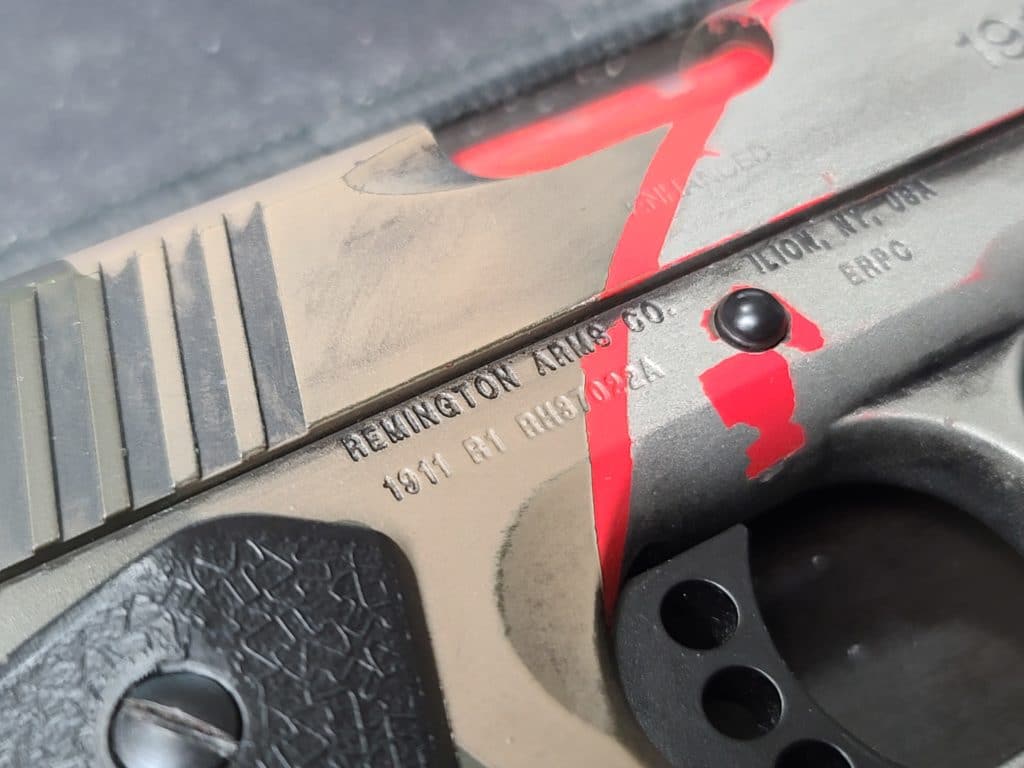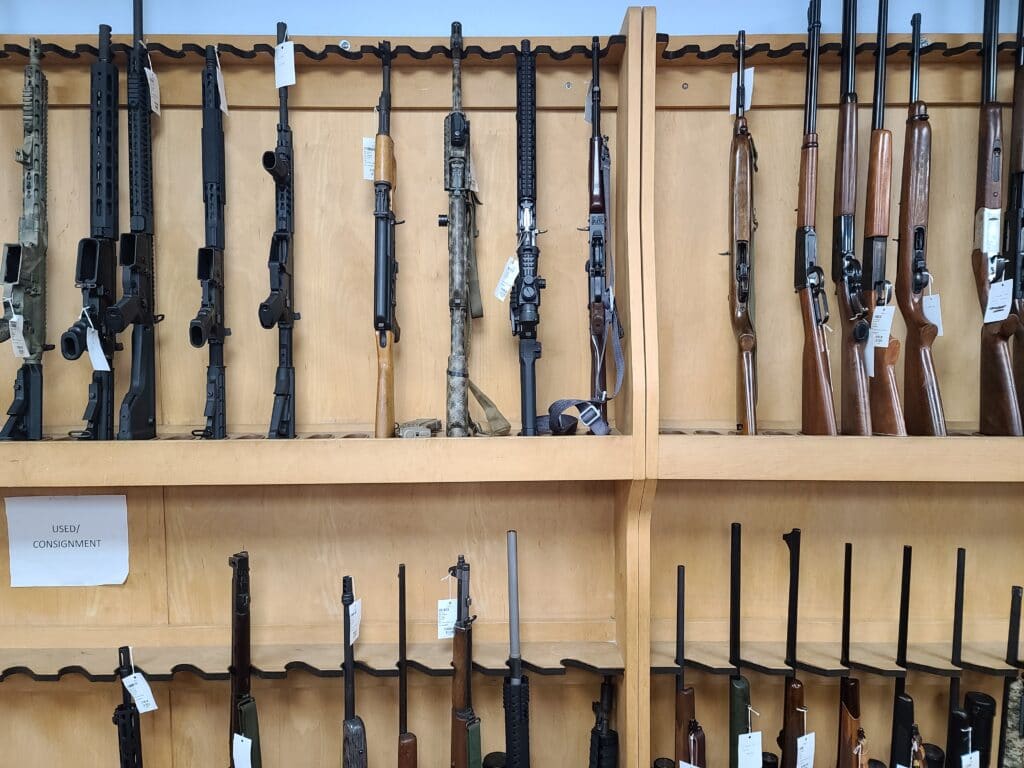We’re diving into more Second Amendment history this week. In the post-Bruen world, it’s becoming more important every day to revisit and understand the past given how quickly new gun cases are piling in.
That’s what a federal judge in West Virginia did on Monday when deciding whether to strike down the ban on scratching off serial numbers. I take a close look at how he found the regulation wasn’t actually related to commercial conduct since it directly banned mere possession. And why he went on to determine there was no historical analogue that could help it withstand Second Amendment scrutiny.
Mexico is also back in the news. Contributing Writer Jake Fogleman looks at the country’s latest team-up with gun-control group Brady to take on the American gun industry. Will this attempt fair any better than the previous one that was tossed just a few weeks back?
Plus, lawyer Kostas Moros joins the podcast to discuss our piece on whether individual gun rights are a modern invention.

Analysis: Why Did a Federal Judge Toss the Ban on Destroying Gun Serial Numbers? [Member Exclusive]
By Stephen Gutowski
A federal judge in West Virginia found the prohibition on possessing a gun with a filed-off serial number unconstitutional. It’s another federal regulation that’s fallen to the new Bruen test, but what was the reasoning behind the decision?
Judge Joseph R. Goodwin ruled against the ban on Wednesday in a criminal case. It’s another example of a law being struck without the involvement of a gun-rights group. In fact, it’s another example of a public defender winning on a Second Amendment argument in the wake of New York State Rifle and Pistol Association v. Bruen.
As required by the standard set in Bruen, Goodwin’s opinion in the case relied on the historical record. It did this despite Goodwin’s apparent distaste for the new test, a surprisingly common occurrence among the district court judges who’ve struck down federal gun provisions post-Bruen.
“Certainly, the usefulness of serial numbers in solving gun crimes makes Section 922(k) desirable for our society. But the Supreme Court no longer permits such an analysis,” Goodwin wrote. “Under Bruen, I am limited to considering whether Section 922(k) is ‘consistent with the Nation’s historical tradition of firearm regulation.’”
The main problem with the ban on the possession of guns with destroyed serial numbers is that it falls outside the scope of commercial regulation, according to Goodwin. Instead, he notes, it is the regulation of gun possession by individuals. So, while it may be constitutional to require manufacturers to engrave serial numbers into their guns or dealers to keep records of them, it is not constitutional to ban the possession of firearms that have had their serial numbers removed.
“Section 922(k) goes farther,” Goodwin wrote. “It criminalizes the mere possession of a firearm after a serial number is removed, obliterated, or altered in any way, whether or not the firearm is then placed into commerce.”
He noted Congress passed the regulation to make it easier for police to trace crime guns by preserving the markings that could help in that process. However, he said it is not difficult to imagine a scenario where an otherwise law-abiding gun owner could run afoul of the law without any criminal intent.
“Assume, for example, that a law-abiding citizen purchases a firearm from a sporting goods store,” he wrote. “At the time of the sale, that firearm complies with the commercial regulation that it bear a serial number. The law-abiding citizen takes the firearm home and removes the serial number. He has no ill intent and never takes any otherwise unlawful action with the firearm. Contrary to the Government’s argument that Section 922(k) does not amount to an ‘infringement’ on the law-abiding citizen’s Second Amendment right, the practical application is that while the law-abiding citizen’s possession of the firearm was originally legal, it became illegal only because the serial number was removed. He could be prosecuted federally for his possession of it. That is the definition of an infringement on one’s right to possess a firearm.”
He extrapolated the theoretical scenario by imagining the same gun being inherited by the original owner’s daughter.
“As it stands, Section 922(k) also makes her possession of the firearm illegal, despite the fact that it was legally purchased by her father and despite the fact that she was not the person who removed the serial number,” Goodwin said. “These scenarios make clear that Section 922(k) is far more than the mere commercial regulation the Government claims it to be. Rather, it is a blatant prohibition on possession.”
That puts the conduct being regulated squarely within the protection of the Second Amendment, which means the restriction is unconstitutional under the Bruen test unless the government can show it is part of a longstanding tradition. Since serialization of any kind wasn’t required until 1968, and the provision on destroying serial numbers wasn’t added until 1990, Goodwin said the only way it could be part of the historical tradition of American gun regulation is if there is an analogue from the early republic.
He argued there isn’t any evidence the Founders addressed the problem of gun violence by requiring serial numbers or other unique markings in order for people to possess guns despite the fact gun violence was a problem they dealt with. In fact, he said under Bruen the fact they dealt with that problem by other means is evidence the serial number requirement for possession is unconstitutional.
He went further and suggested the provision wouldn’t withstand scrutiny under the friendliest examination the Supreme Court allows.
“Even assuming the societal problem addressed by the regulation is ‘unprecedented,’ such that it would have been ‘unimaginable at the founding’ or is based on ‘dramatic technological changes,’ it is the Government’s burden to show that there were analogous regulations at the time to support Section 922(k)’s constitutionality,” Goodwin wrote. “In an attempt to meet its burden, the Government argues broadly that there is a historical tradition of ‘restricting the types of weapons that can be possessed,’ and that ‘there is a general historical practice of imposing ‘conditions and qualifications on the commercial sale of arms.’”
He rejected all of those arguments. He said the regulation in question isn’t of commercial conduct and removing a gun’s serial number doesn’t make it unusual and dangerous. He concluded the provision simply can’t stand under the Bruen standard.
“A firearm without a serial number in 1791 was certainly not considered dangerous or unusual compared to other firearms because serial numbers were not required or even commonly used at that time,” Goodwin wrote. “While I recognize there is an argument, not made by the Government here, that firearms with an obliterated serial number are likely to be used in violent crime and therefore a prohibition on their possession is desirable, that argument is the exact type of means-end reasoning the Supreme Court has forbidden me from considering. And the founders addressed the ‘societal problem’ of non-law-abiding citizens possessing firearms through ‘materially different means’—felon disarmament laws like Section 922(g)(1). Under Bruen, this is ‘evidence that [the] modern regulation is unconstitutional.’”
Judge Goodwin’s opinion is a very faithful implementation of the Supreme Court’s new standard for reviewing gun cases. Ironically, that may not be enough to convince higher federal courts or even the High Court itself. That’s because, as Goodwin himself acknowledges in his ruling, the Court has made a number of passing references to its intention not to cast doubt on commercial gun regulations or statutes aimed at suppressing the criminal use of guns despite not providing historical justification for the constitutionality of the laws.
“Although we do not undertake an exhaustive historical analysis today of the full scope of the Second Amendment, nothing in our opinion should be taken to cast doubt on longstanding prohibitions on the possession of firearms by felons and the mentally ill, or laws forbidding the carrying of firearms in sensitive places such as schools and government buildings, or laws imposing conditions and qualifications on the commercial sale of arms,” the Court said in 2008’s District of Columbia v. Heller.
And, as pro-gun scholar Eugene Volokh noted, the Bruen concurrence by Justices Bret Kavanaugh and John Roberts signals they are more open to gun laws designed to weed out criminal gun use. They defended gun-carry permitting requirements as constitutional so long as the standards are objective and less-than-intrusive.
“Because these licensing regimes do not require applicants to show an atypical need for armed self-defense, they do not necessarily prevent ‘law-abiding, responsible citizens’ from exercising their Second Amendment right to public carry,” Kavanaugh wrote. “Rather, it appears that these shall-issue regimes, which often require applicants to undergo a background check or pass a firearms safety course, are designed to ensure only that those bearing arms in the jurisdiction are, in fact, ‘law-abiding, responsible citizens.’”
Of course, the argument that the ban on the possession of guns with destroyed serial numbers is constitutional because the benefit of tracking guns used in crimes outweighs the burden on Americans’ gun rights is exactly the kind of balancing test the Supreme Court just rejected. So, it’s hard to imagine them going down that road again in this case.
Podcast: The History of Individual Gun Rights With Lawyer Kostas Moros [Member Early Access]
By Stephen Gutowski
On this week’s episode, we’re doing something a little bit different.
Instead of interviewing somebody about something they wrote, I’m talking about a piece I wrote with my co-author. Gun-rights lawyer Kostas Moros joins me to talk about our look at what second-generation Americans thought of the Second Amendment.
We set out to answer a pretty simple question: did gun-rights advocates recently invent the idea that the Second Amendment protects an individual right?
The answer is no.
Moros explains how he used digitized 19th-century writings to show Americans have long viewed gun rights as guaranteed to everyone. Writers famous and forgotten held the same view on that point.
That doesn’t mean they agreed on everything, though. Moros outlines how the 19th-century scholars clashed over whether the Second Amendment restrains the states or just the federal government, especially after a seminal post-civil war Supreme Court decision.
He also delves into the divide over whether weapons useful in military combat are protected and how the modern gun-control debate turns that divide on its head. Instead of arguing “weapons of war” are unprotected by the Second Amendment, 19th-century Americans generally agreed those arms were protected while disagreeing over guns they associated with criminal activity.
Moros, who commonly works on cases for the California Rifle and Pistol Association, also gives us an update on two of the group’s most important cases. One against the state’s magazine capacity limit and the other against a city’s “sensitive places” gun ban.
Plus, Contributing Writer Jake Fogleman explains Mexico’s new suit against American gun dealers.
You can listen to the show on your favorite podcasting app or by clicking here. Video of the show is also available on our Youtube channel. The show goes public every Monday. Reload Members get exclusive access a day before.
Come on the Podcast
One of the many perks of a Reload membership is the opportunity to appear on the podcast. We’ve had a lot of people on the show from all kinds of backgrounds. It’s one of my favorite segments since it gives us all a better insight into the folks who make this publication possible. If you want to come on the show, just reply to this email and let me know!

Analysis: Mexico’s Risky Legal Strategy Against the U.S. Gun Industry [Member Exclusive]
By Jake Fogleman
Not content with seeing one hail-mary lawsuit tossed in court, the government of Mexico is back just weeks later with another case looking to pin liability for criminal gun trafficking on U.S. businesses.
The new suit, filed Monday, takes aim at five gun dealers in Arizona with storefronts near the border. The complaint alleges that the five dealers “systematically participate in trafficking military-style weapons and ammunition to drug cartels in Mexico by supplying gun traffickers.”
“Defendants choose to sell guns using reckless and unlawful practices, despite the foreseeability – indeed, virtual certainty – that they are thereby helping cause deadly cartel violence across the border,” it states. “Defendants engage in these reckless and unlawful actions because it makes them money. This lawsuit intends to hold them accountable, and make them stop.”
These “reckless and unlawful practices,” the suit alleges, consist of the named dealers selling multiple guns to the same person over a “short” period of time. The complaint does not suggest that the defendants sold guns to persons without a background check or any other omission indicating the dealer should have known a sale was illegal.
The suit also attacks the dealers for selling “military-style weapons” (i.e., AR-15s and AK-47s) because they supposedly know that such weapons are “the cartels’ weapons of choice.” Again, the suit does not specify how selling such weapons, which are perfectly legal in Arizona, violates the law. It merely attempts to blame the dealers for guns that eventually ended up in criminal hands in Mexico after ostensibly legal sales in the U.S.
In a further stretch, the Mexican government alleges that the five gun dealers have violated the Racketeer Influenced and Corrupt Organizations Act (RICO). Mexico claims that individuals who have been caught making straw gun purchases for cartel members at each defendant’s business and the dealers constitute a criminal “enterprise” engaged in a “pattern of racketeering activity” sufficient to sue under the RICO Act.
With such tenuous claims, a federal court will likely dismiss this suit, much like Mexico’s previous suit against some of the country’s largest gun manufacturers.
A federal judge tossed that suit for conflicting with the Protection for Lawful Commerce in Arms Act (PLCAA), a liability shield for gun companies against suits over the criminal acts of third parties. And while the previous case was concerned with gun manufacturers, the PLCAA applies equally to gun sellers. It’s hard to see how the PLCAA would not preclude Mexico’s suit once again unless Mexico’s lawyers prove that each gun dealer knew they were selling guns to straw buyers. That’s something they offered no direct evidence for in their complaint. And, presumably, pushing for criminal charges rather than filing a civil suit would be a more logical approach if they had that evidence.
With the odds of success so low, one has to wonder what Mexico’s end game is here.
It’s possible the goal is to publicize a convenient foreign scapegoat as the source of its ongoing criminal violence problems to deflect from its seeming inability (or unwillingness) to clamp down on crime itself. That’s certainly the view of the U.S. firearms industry.
“The crime that is devastating the people of Mexico is not the fault of members of the firearm industry, that under U.S. law, can only sell their lawful products to Americans exercising their Second Amendment rights after passing a background check,” Larry Keane, Senior Vice President and General Counsel of the National Shooting Sports Foundation told The Reload after the country’s first suit was dismissed.
Keane rejected any attempt to make licensed gun dealers and manufacturers in America responsible “for Mexico’s unwillingness and inability to bring Mexican drug cartels to justice in Mexican courtrooms.”
Mexico’s populist left-wing President Andres Manuel Lopez Obrador (AMLO) took office in 2018 on an “Abrazos, no balazos,”–hugs, not bullets–approach to cartel relations. Since then, cartel violence has continued to run rampant. Official documents recently leaked by an online hacker group have also uncovered that the Mexican military has been selling “hand grenades and tactical equipment” to drug cartels during Obrador’s tenure.
Attempting to blame those failures on alleged shady dealings among members of the U.S. gun industry could be a way to demagogue the issue to an understandably exasperated domestic population.
But the strategy carries serious risks. Continuing to file borderline frivolous lawsuits against U.S. businesses risks alienating a potentially sizeable portion of the American public.
President Joe Biden, who has attacked the PLCAA on several occasions, may not be bothered by the tactic. But future presidents, border-state governors, and congressmen could see fit to retaliate against what they see as a foreign government trying to interfere with American gun rights.
That’s it for now.
I’ll talk to you all again soon.
Thanks,
Stephen Gutowski
Founder
The Reload







